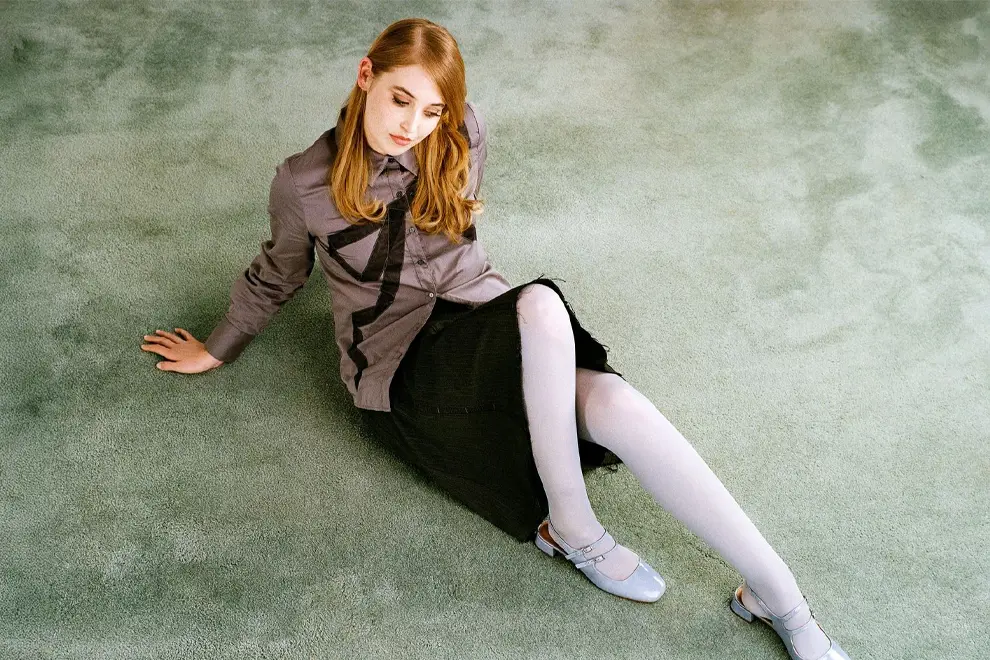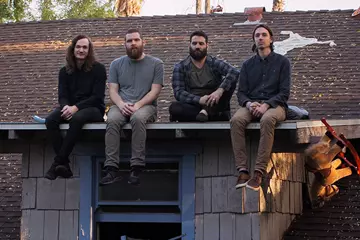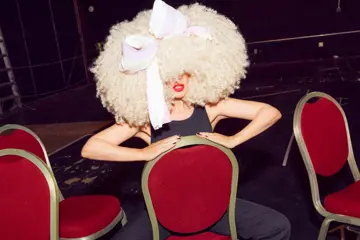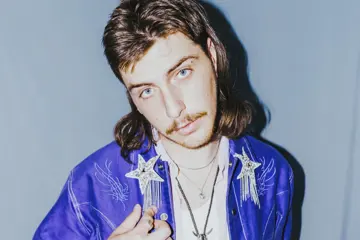 Hatchie
HatchieWhen Harriette Pilbeam broke out with her debut Hatchie EP, 2018’s Sugar & Spice, she was 25. Already a veteran of the Brisbane indie music scene (she’d played in Go Violets and Babaganouj), she’d written a handful of dream-pop earworms about young love, steeped in sounds openly evoking her favourite bands: The Sundays, Cocteau Twins, and The Cranberries.
Three albums, seven years and innumerable tours later, Pilbeam is 32, lives in Melbourne, and has just spent much of the past two years not being Hatchie; recovering from the burnout of riding the buzz-band cycle until she couldn’t anymore.
Returning with her new third LP, Liquorice, Pilbeam is thinking of this album, and this period, as taking Hatchie into a new phase.
“It’s different this time around,” she says. “Being in my 30s, I’m taking things a little more seriously in my life external to the project. It’s not the #1 thing in my life anymore because it just can’t be.
“It’s not sustainable with rent and health insurance and everything like that. And if I want to have kids it’s probably in the next few years. So, I want a solid job. Build up a more comfortable, normal life.”
Don't miss a beat with our FREE daily newsletter
Walking around on the edge of the city on a drizzly Melbourne day (yes, yes, aren’t they all), Pilbeam often turns to the word “sustainable” when talking about her hopes for her career.
“I wrote this album while living my life,” she offers, “rather than putting my life on hold to do the album, which is what I’d done in the past.”
Arriving at this place —a “zen point” where she stopped caring so much about expectations, both external and internal— has been hard. After bestowing her solo project with the childhood nickname she had, growing up as the youngest of four on Brisbane’s North side,
Pilbeam has always felt hugely close to Hatchie. “It’s always felt like an extension of me, a reflection of me and my imagination”.
So, getting to the point where she can have some distance and perspective on the project has, she admits, only come as a result of “a lot of inner work and therapy and journaling”.
It marks a stark change from how she felt with the second Hatchie album, 2022’s Giving The World Away. “I was very concerned with doing what I thought people wanted me to do,” Pilbeam recounts.
“Impressing my future self or proving something. Proving that I could do more. I was very focused on more and better and growth and progress. Playing bigger shows so I could make it my career.”
“With the early stuff getting critical attention as quickly as it did,” she continues. “It made me feel like I could do more… I got a taste of it. We played at Primavera and Pitchfork Festival, we played in all these foreign countries that I never expected to visit.
“So then I was like: ‘fuck yeah, it’s just gonna keep getting better, let’s keep going! Kick it into overdrive!’”
Giving The World Away was an album pushing in that direction, sonically striving, out to sound huge and glossy. It was written in lockdown, when touring logistics were far from front of mind. Pilbeam and her musical/life partner Joe Agius figured it was “now or never” to make a huge statement.
Setting their “sights on something that was massive and really in-your-face”, they moved to Los Angeles, and worked with pop producers Jorge Elbrecht and Dan Nigro.
“I did tick a lot of the boxes that I wanted to tick creatively,” Pilbeam recounts. “I always knew that I wanted the albums to sound bigger as I went along.”
But, through the period of making Giving The World Away, she felt like “everything was leading to something else: That when it came out, we’d start touring, then we’d be able to do this and da-da-da-da. It wasn’t really focused on the present moment.”
That ambition did, she acknowledges, motivate her to “reach further and try harder”, but that striving eventually led her to getting stuck “stuck in [her] own head in a bad way”; wondering why an ambitious album wasn’t furthering her meteoric rise.
“At the end of that time, I wondered: ‘do I actually feel satisfied by this?’” she muses. “I think I had to take some time to redefine what success means to me.”
Admitting that “she was cracking under the pressure” she’d placed upon herself, Pilbeam decided to take a break.
“I was definitely suffering as a result of making it my whole life,” she recounts. “None of it was from people that I work with telling me that I had to do anything. It was all me telling myself that.
“The way the music industry works now is to create this incredible pressure to strike while the iron’s hot. To really lean in when you’re getting a response from the public. Because there’s definitely a fear that if you slow down, you’ll lose the momentum. But, still, it was all me.
“When I told my label and my management that I needed a break between albums, they were all like ‘OK, cool,” she adds. “Nobody said ‘Actually we’ve got this timeline, and you signed a deal…’ It was chill.”
The result of this reset is Liquorice, an album that connects back to the beginnings of Hatchie, for both artist and listener.
“I wanted to go back to the types of songs I started writing originally with this project. I wanted it to be more guitar-focused and more song-focused,” Pilbeam says. “It was a lot more following my instincts, doing what felt right. Writing as much as possible without planning anything.
“It made it way more enjoyable, because I wasn’t concerned about what other people thought. I was just like: ‘I love these songs. I love playing them. I wrote them for my own enjoyment’.”
Produced by Melina Duterte of Jay Som (who has produced records for boygenius, Lucy Dacus and Living Hour), it’s an album filled with lovelorned lyrics and classic dream-pop sounds, especially on the guitar-swept single Only One Laughing.
This means that it not only sounds like classic Hatchie, but like so many of the artists that first inspired the project. Which is something that fans have long embraced.
“There’s a massive part of my fanbase, and you can see it by the demographics of the people who come to the shows, who is doing it for the nostalgia factor,” Pilbeam says.
“I get so many people coming up to me at shows, so excited, saying ‘I saw The Sundays and the Cocteau Twins in the ’90s, and when I found your music I felt like you were really tapping into that spirit!’ Which is really cool.
“I’m still shocked that there are so many people giving me that tick of approval.”
Hatchie’s Liquorice is out now.
This piece of content has been assisted by the Australian Government through Music Australia and Creative Australia, its arts funding and advisory body


















